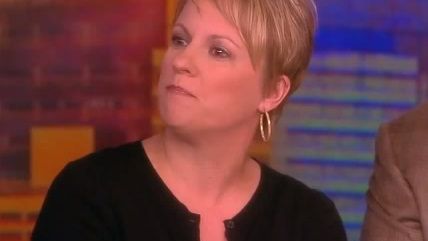Anti-Feminist Speaker Disinvited to 'Uncomfortable Learning' Lecture Series. She Made Students Uncomfortable.
Safe-spacers pressure Williams College group to cancel Suzanne Venker


A student group at Williams College that hosts speakers who challenge the campus's biases has rescinded a speaking invitation to Suzanne Venker, a conservative author and vocal critic of feminism, in response to furious condemnation from other students.
The decision to disinvite Venker is steeped in irony, given that the group's lecture series is called "Uncomfortable Learning," and the sole reason for ditching Venker seems to be that she was a good fit.
Venker penned an op-ed for Fox News lamenting the group's decision:
Despite the fortuitous match between my message and the 'Uncomfortable Learning Speakers Series,' my talk was cancelled several days prior to the event. "Thank you for agreeing to speak," read the email, "but we're not going to be able to host this event."
Though my contact didn't give a reason, the day before he'd sent me this email: "Dear Ms. Venker, A quick heads up…We've been advertising the event, and it's already stirring a lot of angry reactions among students on campus. We just wanted to make you aware of the current state of students before your presentation…"
When I pressed further as to why the event was being cancelled (though of course I knew why), he conceded that Williams College "has never experienced this kind of resistance" to a campus speaker.
To be clear: Venker was disinvited by the students who had asked her to speak in the first place, not by the college. Mary Dettloff, a spokesperson for the college, told me that Williams has "a history of bringing controversial speakers to campus."
"We don't shy away from that," she said in an interview with Reason. "We don't cancel commencement speakers."
Rather, it was the students who host the Uncomfortable Learning series—an unofficial, unregistered campus club—who ultimately made the decision.
"They were feeling very uncomfortable about the amount of protest and the tenor of the protest that was going on," said Dettloff. "Students were being very vocal about not wanting her to come here. I think it was just getting a lit bit over the top."
Zach Wood, a co-president of the group, told me he had been very reluctant to cancel Venker, but it seemed like the right thing to do after another student accused him of "dipping your hands in the blood" of marginalized people in a Facebook comment (this link goes to an op-ed by Wood that includes the comment):
"When you bring a misogynistic, white supremacist men's rights activist to campus in the name of 'dialogue' and 'the other side,' you are not only causing actual mental, social, psychological, and physical harm to students, but you are also—paying—for the continued dispersal of violent ideologies that kill our black and brown (trans) femme sisters. You are giving those who spout violence the money that so desperately needs to be funneled to black and brown (trans) femme communities, to people who are leading the revolution, who are surviving in the streets, who are dying in the streets. Know, you are dipping your hands in their blood, Zach Wood."
While no direct threats were made against the group, Wood told me he was worried that things would get out of hand if the event proceeded.
"Originally, I was opposed to the idea of canceling, I thought we should go ahead and do it," he said in an interview with Reason. "Their concerns were we might need security for this, we really didn't know if it would just be a shouting contest."
Venker was dismayed by the decision, in part because she had set aside time for the event—delaying work on a book to craft a suitable speech.
"It's not a small thing to cancel people last minute," she said in an interview with Reason. "You don't come up with a speech in an hour."
Her chief concern, however, was what her disinvitation said about the student population at Williams.
"This whole push for silencing dissent… it undermines the entire purpose of college," she said. "It makes a huge statement about your position. If you can't even handle hearing another position, obviously you're not comfortable with your own."
Williams is a private college, so it's not obligated under the First Amendment to guarantee freedom of speech to students, faculty, or guest speakers. And even if it was obligated to make those guarantees, student groups would still be free to change their minds about who they want to bring to campus, as long as the administration did not interfere. For these reasons, it would be wrong to brand Venker's disinvitation as an example of censorship; some students exercised their right to invite a controversial speaker, other students exercised their right to criticize them for it, and the first group of students exercised their right to respond to criticism and change their minds.
Now it's my turn: the claim made by some students that inviting Venker was a literal act of violence is ludicrous, as is the idea that there was nothing to gain by hearing her speak. As Venker herself observed, if a student's own opinions are so fragile that listening to a contrary take—or even temporarily residing in the same place as someone presenting a contrary take—is psychologically scarring, that student needs help. (And probably some level of exposure to contrary opinions, as Greg Lukianoff and Jonathan Haidt argued in their Atlantic cover story, "The Coddling of the American Mind.")
It's frustrating that an editorial in the student newspaper grappling with the Venker disinvitation gets this so wrong:
In general, the College should not allow speech that challenges fundamental human rights and devalues people based on identity markers, like being a woman. Much of what Venker has said online, in her books and in interviews falls into this category. While free speech is important and there are problems with deeming speech unacceptable, students must not be unduly exposed to harmful stereotypes in order to live and learn here without suffering emotional injury. It is possible that some speech is too harmful to invite to campus. The College should be a safe space for students, a place where people respect others' identities. Venker's appearance would have been an invasion of that space.
The editorial board did see some value in exposing students to Venker's position, but ultimately couldn't agree on whether the benefits outweighed the negatives.
Even if "some speech is too harmful to invite to campus," this speech does not and should not include people who merely make assertions about feminism that discomfort the left. I don't particularly share Venker's views, but I find it likely that I could learn something from her—even if what I learned was that I was right to reject much of what she has to say. Indeed, this is the entire purpose of the Uncomfortable Learning speaker series: allow students to hear perspectives they would never encounter inside the liberal bubble of Williams.
Too many students see the bubble as a feature, not a bug, and would evidently solidify its membrane to prevent intrusions of disagreeable outsiders, if they could. That really is their loss. College should be a safe-space for the free expression of ideas—even controversial ones—not a zone of enforced emotional comfort.


Show Comments (152)